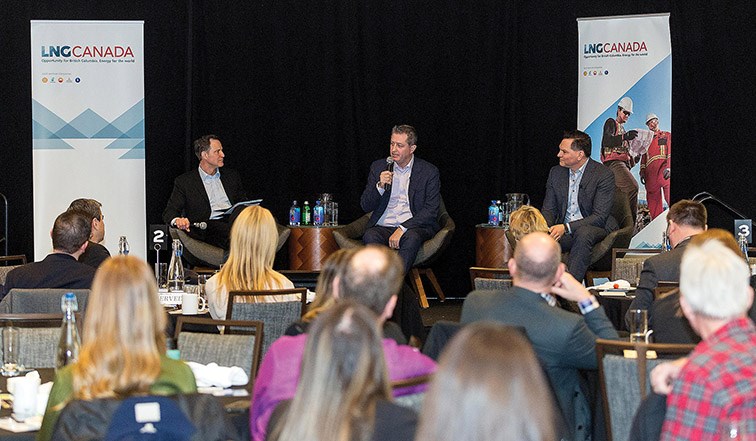The top bosses of Coastal GasLink and LNG Canada were in Prince George on Tuesday for the #TrueNorth Business Forum.
Coastal GasLink president David Pfeiffer and LNG Canada CEO Peter Zebedee sat down for a panel discussion at the one-day event, hosted by the Prince George and provincial chambers of commerce. The panel discussion was hosted by Bryan Cox, president and CEO of the BC LNG Alliance – an industry advocacy group.
Coastal GasLink in building a 670-kilometre natural gas pipeline from northeast B.C. to Kitimat, to serve the LNG export terminal LNG Canada is building. The combined value of the project is estimated at $6.6 billion.
Pfeiffer and Zebedee started off addressing the elephant in the room: the ongoing blockade southwest of Houston, B.C. by a group of Wet'suwet'en hereditary chiefs and their supporters. On Jan. 3, the Wet'suet'en hereditary chiefs and members of the Unist'ot'en camp issued an "eviction notice" to workers at camp 9A and the surrounding area, part of an ongoing conflict about the development.
From day one, Coastal GasLink realized the importance of getting social licence from the communities and First Nations along the pipeline route, Pfeiffer said.
"We held meetings with all 20 of the nations (along the route), both elected and hereditary," Pfeiffer said. "In most of the nationas the elected and hereditary systems work together very well."
Those meetings have resulted in cooperation agreements with 20 First Nations, including elected councils representing some of the Wet'suwet'en First Nations like the Skin Tyee First Nation.
"One third of our feildwork was done by indigenous people, indigenous companies, in the north," Pfeiffer said. "It's just such a great story."
Pfeiffer said the company is still hoping to resolve the dipute with the Wet'suwet'en peacefully, without enforcing a court injunction granted to them by the B.C. Supreme Court on Dec. 31.
"The reality is, I really want to emphasize, that adequate consultation has occured," Zebeedee said.
Both Pfeiffer and Zebeedee said their companies expect to ramp up construction this year.
"We just finished what we call our pioneering work, clearning the land. We ended the year, 2019, with just under 1,500 people on the site," Zebedee said. "We expect to have 3,000 workers on site by the end of the year."
Pfeiffer said 2020, 2021 and 2022 will be the major years for constructing the pipeline.
"We've got about 1,000 (people) working on the project now," he said. "We'll ramp up to about 2,500 this summer."
Billions is expected to be spent over the course of the coming years, they said.
"As the industry guy, I'm pumped about this project," Cox said. "They're showing us the way in this brand-new industry."



